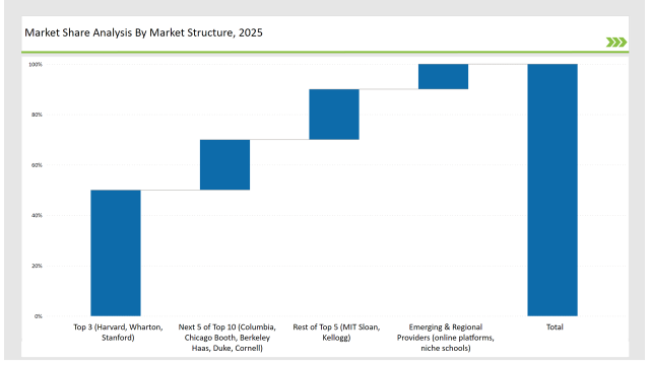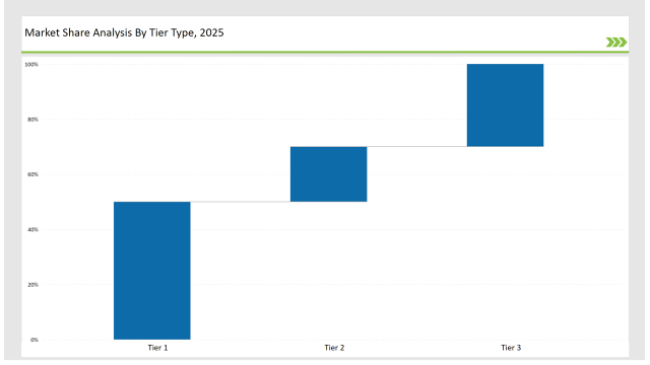The USA executive education market is led by the country's most prestigious universities, and its elite business schools, focusing on corporate leaders and professionals who want to improve their skills. Leaders in this market are the likes of Harvard Business School, Wharton, and Stanford, which hold about 60% market share. These institutions are characterized by their stringent curricula, world-class faculty, and international recognition. They are the first stop for most executives who do not have high expectations other than the best. Regional universities and specialized institutes conducting niche and industry-specific programs take about 30% of the market. Such institutions cater to professionals who seek more tailored learning experiences with a higher degree of focus on particular industries or skills. In that sense, other 10 percent share will go into online platforms, as well as to new suppliers of education to those appealingly rising numbers seeking access, convenience, and ease in learning, literally from everywhere, for the ongoing increase in the number of participants interested in executive education will keep propelling different players' futures of professional development in the United States.
| Global Market Share, 2025 | Industry Share (%) |
|---|---|
| Top 3 (Harvard, Wharton, Stanford) | 50% |
| Rest of Top 5 (MIT Sloan, Kellogg) | 20% |
| Next 5 of Top 10 (Columbia, Chicago Booth, Berkeley Haas, Duke, Cornell) | 20% |
| Emerging & Regional Providers (online platforms, niche schools) | 10% |

The USA executive education program market in 2025 is highly concentrated, with top universities such as Harvard, Stanford, and Wharton commanding a significant share. While online education platforms and corporate training providers contribute to diversification, established institutions continue to lead due to their reputation and industry partnerships.
Executive education can be followed through a variety of mediums: in-person courses and digital platform courses. In-person classes are most prevalent at 55% and utilize the immersive environment of a leading university for learning. Hybrid on-campus as well as online models are availed by 30% to make it practical for working professionals to attend classes. Fully online, 15% is growing due to innovation of ed-tech and ease.
The leadership and management programs make up 40% of the market, targeting core skills for senior executives. Industry-specific programs targeting sectors such as healthcare, technology, and finance make up 30%. Custom corporate programs tailored to organizations make up 20%, while entrepreneurial and innovation-focused programs make up 10%, targeting start-ups and growth-driven professionals.
Innovation in pedagogy and expansion of accessibility marked the USA executive education market in 2024. The market leaders are as follows:

| Tier Type | Tier 1 |
|---|---|
| Example of Key Players | Harvard, Wharton, Stanford |
| Market share% | 50% |
| Tier Type | Tier 2 |
|---|---|
| Example of Key Players | MIT Sloan, Kellogg |
| Market share% | 20% |
| Tier Type | Tier 3 |
|---|---|
| Example of Key Players | Regional universities, online platforms |
| Market share% | 30% |
| Institution | Key Focus Areas |
|---|---|
| Harvard Business School | Leadership development and global strategy |
| Wharton | Finance, analytics, and decision-making |
| Stanford | Innovation and design thinking |
| MIT Sloan | Digital transformation and AI integration |
| Kellogg | Corporate partnerships and tailored programs |
| Emerging Platforms | Accessible and flexible online programs |
The USA executive education market is expected to see significant growth through digital innovation, customized offerings, and increased global demand for advanced professional development. As the market continues to grow, institutions will begin to increasingly rely on hybrid and online learning models, leveraging advanced technologies to better the educational experience. This would provide more flexibility for busy professionals while maintaining high standards of executive education. More can be expected at the same time, and more corporate partnerships will emerge as companies begin collaborating with universities to tailor courses that match specific company needs and workforce requirements. These partnerships will bridge the gap between academic theories and realities of a business. In addition, courses will be strongly focused on areas such as ESG principles and industry-specific skills, reflecting the increasing importance of sustainable and ethical leadership. Alongside these digital offerings, experiential learning hubs on university campuses will be developed so students can experience hands-on learning while retaining the prestige and value of in-person education. This fusion of tradition and innovation will definitely help to ensure that executive education meets the changing needs of professionals and organizations.
Leading business schools such as Harvard, Wharton, and Stanford among others control approximately 50% of the market.
Regional universities and corporate training programs hold around 30% of the market.
Digital learning platforms like Coursera and edX account for roughly 15%.
Company-specific executive training holds approximately 5% of the market.
High for institutions controlling 50%+, medium for 30-50%, and low for under 30%.






Our Research Products

The "Full Research Suite" delivers actionable market intel, deep dives on markets or technologies, so clients act faster, cut risk, and unlock growth.

The Leaderboard benchmarks and ranks top vendors, classifying them as Established Leaders, Leading Challengers, or Disruptors & Challengers.

Locates where complements amplify value and substitutes erode it, forecasting net impact by horizon

We deliver granular, decision-grade intel: market sizing, 5-year forecasts, pricing, adoption, usage, revenue, and operational KPIs—plus competitor tracking, regulation, and value chains—across 60 countries broadly.

Spot the shifts before they hit your P&L. We track inflection points, adoption curves, pricing moves, and ecosystem plays to show where demand is heading, why it is changing, and what to do next across high-growth markets and disruptive tech

Real-time reads of user behavior. We track shifting priorities, perceptions of today’s and next-gen services, and provider experience, then pace how fast tech moves from trial to adoption, blending buyer, consumer, and channel inputs with social signals (#WhySwitch, #UX).

Partner with our analyst team to build a custom report designed around your business priorities. From analysing market trends to assessing competitors or crafting bespoke datasets, we tailor insights to your needs.
Supplier Intelligence
Discovery & Profiling
Capacity & Footprint
Performance & Risk
Compliance & Governance
Commercial Readiness
Who Supplies Whom
Scorecards & Shortlists
Playbooks & Docs
Category Intelligence
Definition & Scope
Demand & Use Cases
Cost Drivers
Market Structure
Supply Chain Map
Trade & Policy
Operating Norms
Deliverables
Buyer Intelligence
Account Basics
Spend & Scope
Procurement Model
Vendor Requirements
Terms & Policies
Entry Strategy
Pain Points & Triggers
Outputs
Pricing Analysis
Benchmarks
Trends
Should-Cost
Indexation
Landed Cost
Commercial Terms
Deliverables
Brand Analysis
Positioning & Value Prop
Share & Presence
Customer Evidence
Go-to-Market
Digital & Reputation
Compliance & Trust
KPIs & Gaps
Outputs
Full Research Suite comprises of:
Market outlook & trends analysis
Interviews & case studies
Strategic recommendations
Vendor profiles & capabilities analysis
5-year forecasts
8 regions and 60+ country-level data splits
Market segment data splits
12 months of continuous data updates
DELIVERED AS:
PDF EXCEL ONLINE
Industry Share & Competitive Positioning in Executive Education Program
Executive Education Program Market Size and Share Forecast Outlook 2025 to 2035
Canada Executive Education Program Market Size and Share Forecast Outlook 2025 to 2035
Online Executive Education Program Market Trends – Growth & Forecast 2024-2034
Nordics Executive Education Program Market Size and Share Forecast Outlook 2025 to 2035
United States Executive Education Program Market Size and Share Forecast Outlook 2025 to 2035
USA Educational Tourism Market Report – Size, Growth & Industry Trends 2025-2035
Market Share Distribution Among USA Labels Providers
Market Share Insights of Leading Sausage Casing Providers
Industry Share Analysis for Reusable Wine Bags Companies
Evaluating USA Luxury Fine Jewelry Market Share & Provider Insights
A Detailed Global Analysis of Brand Share for the Reusable Period Panties Market
Evaluating Reusable Cold Chain Packaging Market Share & Provider Insights
A Detailed Global Analysis of Brand Share for the Reusable Incontinence Products Market
Analyzing India Loyalty Program Market Share & Industry Leaders
Market Share Breakdown of USA and Canada Molded Fiber Pulp Packaging Manufacturers
Examining Market Share Trends in Leadership Development Programs
Assessing Tourism Industry Loyalty Program Market Share & Industry Trends
Executive Coaching Certification Market Size and Share Forecast Outlook 2025 to 2035
USA Medical Coding Market Size and Share Forecast Outlook 2025 to 2035

Thank you!
You will receive an email from our Business Development Manager. Please be sure to check your SPAM/JUNK folder too.
Chat With
MaRIA